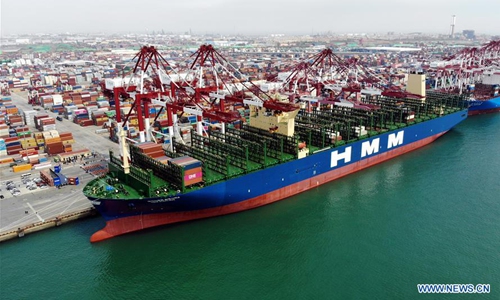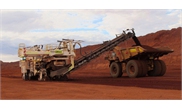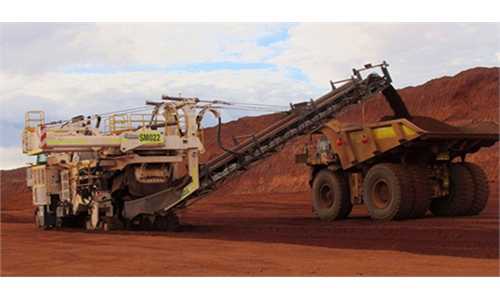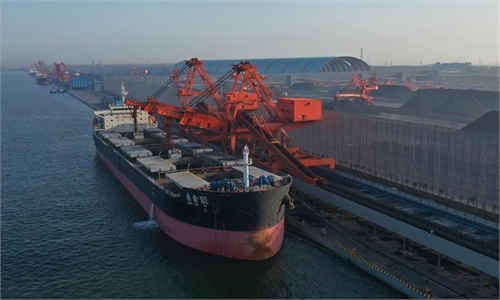
Aerial photo taken on April 26, 2020 shows HMM Algeciras docking at Qingdao Port in Qingdao, east China's Shandong Province. (Xinhua/Li Ziheng)
With more sources becoming available worldwide, Australia, as the world's largest iron ore supplier, is expected to be under increasing pressure and its near-monopoly pricing power will be threatened, industry analysts said.
More diverse sources could become available to China, the world's top buyer, amid rising tensions with its biggest iron ore supplier of Australia, they said.
The comments came after Brazilian iron miner Vale - a leading world participant in the sector - announced that it had received permission to reopen mines in the Itabira complex that were shuttered due to coronavirus concerns. There will be no change to its iron ore output guidance of 210-330 million tons for this year.
Baowu Steel Group, a Chinese state-owned iron and steel company, said it will start construction of the Simandou iron mine in Guinea, which has estimated reserves of 10 billion tons of ore grading 65 percent iron metal, according to caixin.com.
"In the long run, these sources, especially the Simandou mine, the largest untapped source of iron ore in the world with the highest quality, will ease China's dependence on Australian iron ore," Yu Lei, chief researcher at the Research Center for Pacific Island Countries with Liaocheng University, told the Global Times on Sunday.
According to China's Ministry of Commerce, China is highly dependent on imported iron ore as 80 percent of the raw material is imported.
In 2019, China imported 1.07 billion tons of iron ore, of which more than 60 percent came from Australia, according to industrial media.
However, despite being Australia's biggest iron ore buyer, China has much weaker pricing power due to Australia's near-monopoly. Once iron ore demand in China rises, the ore price would also increase, Yu said. Iron futures hit 778 yuan ($110) per ton on Friday, up more than 40 percent from April, as stockpiles at 45 Chinese ports hit four-year lows.
Despite the huge iron ore trade between China and Australia, bilateral ties are soured in recent months. In May, China imposed anti-dumping and countervailing tariffs of more than 80 percent on Australian barley, a move intended to protect Chinese farmers' interests.
There has been hearsay for years in the industry that China has been working with the Simandou mine, but there had been no real exploitation until the Baowo announcement, according to Wang Guoqing, research director at the Beijing Lange Steel Information Research Center.
"[Baowu] chose this timing to indicate that the construction might relate to the row between China and Australia, as China is seeking to diversity its iron ore sources to lower dependence on Australian iron ore," Wang noted.
Having more suppliers will deepen China's iron ore import diversification, and give Beijing more chips when dealing with Australia, according to Wang.
Wang noted that, even though Baowu's announcement could drive up market expectations as iron ore is more financialized now, it's just "an expectation ... the real impact might take years to come."
"It is hard to see a quick change in China's iron ore import structure as the construction of the Simandou mine may take years, but in the long run, it will definitely have a huge impact on Australia's iron ore sector and Australian suppliers should keep their eyes on it," Yu said.



